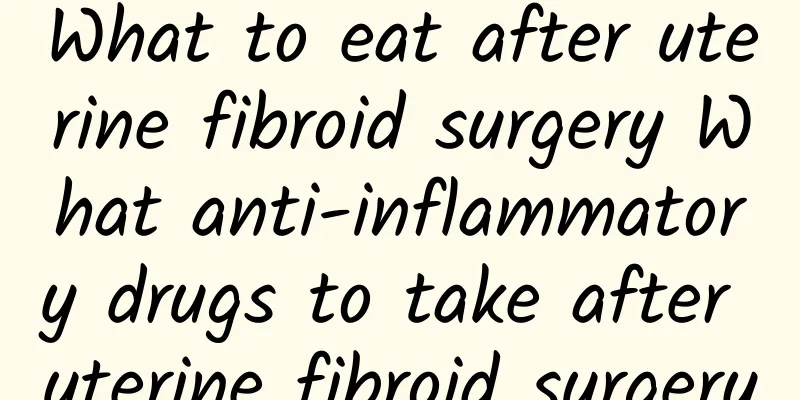What to eat after uterine fibroid surgery What anti-inflammatory drugs to take after uterine fibroid surgery

|
introduce Uterine fibroid surgery is one of the most common methods for treating uterine fibroids. The right diet and medication after surgery play an important role in recovery. This article will discuss the two questions in detail: "What to eat after uterine fibroid surgery" and "What anti-inflammatory drugs to take after uterine fibroid surgery". 1. Recovery diet: lightly digestible food During the recovery period after surgery, the patient's gastrointestinal function is weak, and it is necessary to choose light and easily digestible food. Eating more foods rich in protein, vitamins and minerals, such as eggs, fish, lean meat, beans, fruits, etc., can help provide the body with the nutrients it needs. 2. Dietary principles to follow: Eat more and eat less, quit smoking and drinking To promote wound healing after surgery, patients should eat more meals and avoid overeating and excessive fullness. In addition, they can drink warm water in moderation to maintain water balance. At the same time, patients should also avoid drinking and smoking, as these habits will delay the wound healing process. 3. Dietary taboos that need to be noted: irritating foods and foods that are difficult to digest In the diet after surgery, you should avoid eating irritating foods such as peppers, peppers, onions, ginger, garlic, etc. These foods may irritate the wound and delay wound healing. In addition, foods that are difficult to digest such as fried foods and high-fat foods should also be avoided as much as possible to avoid adding burden to the gastrointestinal tract. 4. Choice of anti-inflammatory drugs after uterine fibroid surgery After uterine fibroid surgery, the doctor may prescribe some anti-inflammatory drugs according to the patient's specific situation. Common anti-inflammatory drugs include non-steroidal anti-inflammatory drugs (NSAIDs) and antibiotics. However, patients must strictly follow the doctor's instructions when using anti-inflammatory drugs, and must not increase or decrease the dosage or use it for a long time without authorization to avoid potential side effects. 5. Dietary advice: Eat more high-fiber foods After uterine fibroid surgery, eating more fiber-rich foods, such as whole wheat bread, brown rice, vegetables and fruits, can help prevent constipation and maintain normal intestinal peristalsis. In addition, fiber can also absorb waste in the intestines, help detoxify, and maintain intestinal health. 6. Supplement nutrients: calcium and vitamin D After surgery, it is important to take adequate calcium and vitamin D. Uterine fibroid surgery may affect the patient's estrogen levels, which may lead to osteoporosis. Therefore, patients can take in enough calcium and vitamin D through their daily diet or supplements to ensure good bone health. in conclusion Diet and medication selection after uterine fibroid surgery play a vital role in recovery. During the recovery period, patients should follow the principle of eating small and frequent meals, avoiding irritating foods and foods that are difficult to digest, and actively and reasonably use anti-inflammatory drugs prescribed by doctors. In addition, in order to promote wound healing and ensure bone health, it is also crucial to supplement proper nutrients. Patients should follow the doctor's instructions and pay attention to the adjustment of personal diet and lifestyle habits to accelerate the recovery process. |
Recommend
What are the hazards of female cervical erosion repair surgery? What should be paid attention to when treating cervical erosion?
There are many women who suffer from gynecologica...
After menstruation, vaginal bleeding still occurs. What disease is this?
After menstruation, vaginal bleeding still occurs...
Experts explain: How to treat irregular menstruation
When it comes to irregular menstruation, almost a...
How to treat pelvic inflammatory disease after abortion? In addition to treatment, you also need to know 3 nursing methods for pelvic inflammatory disease.
Once you have pelvic inflammatory disease after a...
Gastric water polo player removed the stomach after 6 months, and celebrities are also crazy
Since Dr. Edward Mason, the "father of baria...
Soy milk helps lose weight! Is sugar-free soy milk the first choice after exercise?
Exercise to lose weight has become a trend, but i...
Common clinical symptoms of cervicitis
The incidence of cervicitis is still very high in...
How to care after surgery for chronic pelvic inflammatory disease
Many women suffer from pelvic inflammatory diseas...
The difference between self-testing fungal and bacterial vaginosis
The difference between self-diagnosed candidal va...
Drinking coffee is very harmful to women with dysmenorrhea
Drinking coffee is a habit of modern urban women....
What vegetables are better for patients with threatened abortion?
Threatened abortion is actually not that scary. A...
Traditional Chinese medicine Shugan Sanjie decoction can effectively treat uterine fibroids
Shugan Sanjie Decoction is a commonly used prescr...
What is vulvar pruritus?
What is vulvar pruritus? Vulvar itching may be ca...
Eating more pears in autumn and winter is good for health preservation and Chinese medicine treatment
In traditional Chinese medicine, autumn is classi...
Can long-term dysmenorrhea be cured?
Can long-term dysmenorrhea be cured? The problem ...









